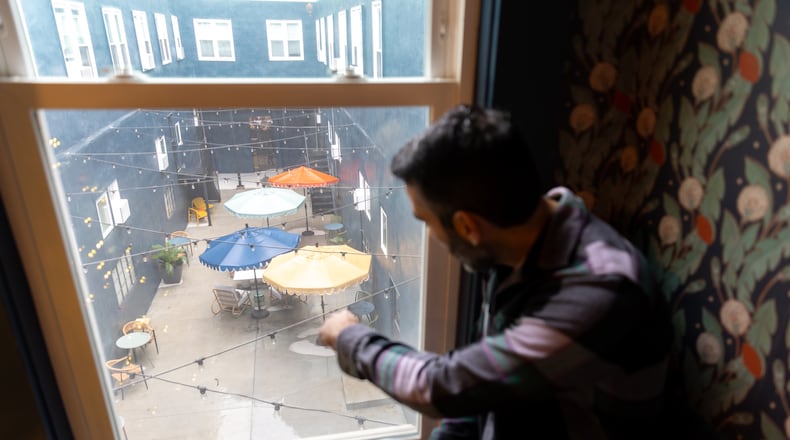Transforming the Otto’s Apartment Hotel into pocket-size apartments was about more than just reviving a grand landmark. For developers Benjamin McLoughlin and Michael Garber, it was really about offering affordable living in the heart of the Poncey-Highland neighborhood.
“The one thing we both shared was that Atlanta was losing its culture,” McLoughlin said. “Ultimately, artists and creatives — they’re the culture of the city. If you price them out, what are you left with?”
Years ago, McLoughlin would drive by the building on North Highland Avenue and muse about buying the hotel, formerly known as the Highland Inn and Ballroom.
That dream became a reality in early 2021, when the two men acquired the hotel and neighboring retail space for $7.85 million through their real estate development firm, Canvas Companies.
Within three years, they had given the hotel a major face-lift, revamping the 112 rooms into 70 modern “microapartments.” Most of the hotel’s units are around 300 square feet, with the smallest units coming in at around 200.
Credit: arvin.temkar@ajc.com
Credit: arvin.temkar@ajc.com
The lexicon might be new, but tiny apartments have existed in one form or another for years (think: studio apartment). But as city planners, developers and housing advocates witnessed pandemic-era currents decimate downtowns across the country, emptying office buildings and driving people to work remotely in the suburbs, they seized on the idea of transforming spaces like vacant city malls, office buildings, hotels and motels into affordable housing.
Today, the Otto has a vintage aura, recalling the days when it was known as the Wynne Apartment Hotel and featured a dining room, bowling alley, indoor swimming pool, car and maid service. A digitized copy of a newspaper clipping from the 1930s says the hotel was “suitable for couples and bachelors.”
The latest iteration has a neon vacancy sign that hearkens back to simpler times, with the portico hovering over a twin stoop and brick masonry facade. In the lobby is a basket of umbrellas inscribed with the Otto’s Apartment Hotel’s winking owl trademark. Adjoining the hotel lobby is a cozy lounge with umbrella lampshades, fresh floral wallpaper and bar furniture.
Doused in a shock of burnt blue and bright teal paint, the interior is inspired by colors and patterns the two men found when they stripped back the layers on the building’s interior walls.
Garber acknowledged there have been moments of crushing doubt during the rehab.
“We were a little terrified. Is anyone going to live in these small units?” Garber said.
As it turns out, the 300-square-foot units have been the “sweet spot,” according to McLoughlin. On reflection, it’s easy to see why. The cheapest units in the building start around $1,175, a comparatively affordable price point in a bustling part of the city near the Beltline trail and Ponce City Market. The costliest are more than $1,700, they said, excluding utilities and internet.
Downsizing
Credit: arvin.temkar@ajc.com
Credit: arvin.temkar@ajc.com
The concept of turning hotel rooms into microapartments doesn’t just apply to people moving into the Otto. City officials plan to turn a former Ramada Plaza Hotel in the Summerhill neighborhood into affordable one- and two-bedroom apartments.
In November, the Atlanta Housing Authority said it was looking for a development partner for the hotel. The housing authority’s president and CEO, Terri Lee, will consider the most “creative and innovative solutions for housing,” with microapartments in the mix for the property on Hank Aaron Drive.
“The original footprint (of) those units are small, and so depending upon the adaptive reuse that is recommended, there is a possibility for some micro use,” Lee said.
Will Johnston, executive director of the MicroLife Institute, a national nonprofit housing developer headquartered in Atlanta, said microliving requires a shift in the way Atlantans think about housing.
After all, single-family homes with white picket fences and ample backyards are ingrained in the idea of the American dream. But as cities like Atlanta confront urban sprawl and a nationwide affordability crisis, hotel-to-residential conversions are one tool to carve out homes in cramped spaces.
Rehabbing hotel or motel rooms makes a lot of sense, Johnston said, because unlike malls or office buildings, the properties have architectural elements to create livable homes, including existing plumbing, corridors, natural light and bathrooms. The cost savings can be passed on to residents.
“If you take a hotel or an extended stay and turn it into a 400-square-foot microapartment, that’s a win-win,” Johnston said. “Instead of rebuilding the whole structure, you’re not having to do an extreme renovation. But you’re able to renovate in a way that creates attainable and affordable prices for the apartments.”
For others, microliving is about returning to Atlanta’s roots and the concept that less really can mean more, especially in the city’s walkable neighborhoods. Garber said more Otto tenants have registered bikes than cars, showing they are making the most of a neighborhood bordering the Old Fourth Ward.
“Our tenants are not living here and driving 30 minutes out of town to their job,” he said. “They’re walking down the road to their favorite restaurant. They’re hanging out at the bar. They’re hanging out at the bakery, checking out the arts. They’re on bikes. They’re on the Beltline.”
Proximity to Freedom Park, a movie theater and grocery store were among the reasons Otto resident Michelle Warhola signed a 16-month lease. The 45-year-old wants to eventually buy a plot of land and build her own tiny home, and said moving into a smaller unit is a way to slowly downsize.
She said affordability is “relative” but noted she had previously paid $2,300 for a one-bedroom in the Old Fourth Ward. Including utilities, internet and water, she is spending about $1,870 a month for the 400-square-foot apartment. The smaller space took some getting used to, especially because she likes to entertain. Now, she is right at home.
“I think it is a decent price for the location. I’m all about location and being in the middle of what’s going on, and easy access to everything,” she said.
Single-room occupancy in Atlanta and other cities was common until the 1950s, when rooming houses and residential hotels were etched in America’s housing landscape, said Alex Horowitz, a housing policy researcher at The Pew Charitable Trusts.
There is a shortage of between 4 million and 7 million homes, according to Pew, and in Atlanta, about 100,000 homes are needed to bridge the gap, states a recent report published by Up For Growth, a coalition of housing advocacy groups.
With the need for more housing options urgent, Horowitz said converting office buildings into co-living, dorm-style apartments is one way to help ease the crisis.
Pew and the global architectural firm Gensler have come up with an economic approach to office-to-residential conversions. They suggest shrinking units to between 120 and 180 square feet and incorporating shared bathrooms and laundry rooms.
Credit: arvin.temkar@ajc.com
Credit: arvin.temkar@ajc.com
But office conversions can still be costly. That’s why some developers have eyed vacant or neglected hotels. Still, it doesn’t mean hotel-to-residential conversions are a walk in the park.
Stryant Investments co-founder and developer Stan Sugarman rehabbed the former Atlanta Motel on Moreland Avenue. Opening in December as the Ralph David House, Sugarman transformed the eyesore into more than 50 microapartments offering permanent supportive housing for homeless people in Reynoldstown. Most of the units are less than 300 square feet, he said.
There are a “million little things” to consider when converting a hotel into apartments, the developer added, including electrical, plumbing, internet, a new sprinkler system and upgrades so people with disabilities can have access.
Even so, he said office developments create headaches because existing plumbing, electrical, heating and cooling systems are usually designed with cubicles and workers in mind.
“Office buildings become very tricky. You only have so many windows. It’s definitely a lot more challenging,” Sugarman said.
It was the city’s idea to turn the motel rooms into microapartments for unhoused people, the developer said. Funding from the city’s affordable housing fund, the Atlanta Beltline and Partners for Home, which coordinates the city’s homeless strategy, helped bring the project to life.
Partners for Home CEO Cathryn Vassell said the idea came to city officials after pandemic emergency funds were used to provide temporary accommodation for homeless people at the Ramada Plaza Hotel.
Tiny apartments might be a fresh spin on an old idea. But as housing becomes more expensive in the city, she said smaller spaces are essential to tackling homelessness.
“We’ve got to reconsider how we’ve thought about density and the size of our living environments,” Vassell said. “After World War II there was single-room occupancy housing, rooming houses. We have to get back to a place where we’re thinking creatively about how we create housing for everybody along the income spectrum.”
Credit: arvin.temkar@ajc.com
Credit: arvin.temkar@ajc.com
Vassell is alert to the opportunities, but said hotels and motels within city limits are in short supply.
“A lot of it is right outside (the) city of Atlanta. So that’s been a little bit tricky for us,” she said.
That’s why Pew favors converting some of the billion square feet of unused office space across the country into housing, according to Horowitz.
“Hotels are in demand. Well-located hotels in many markets are doing well. Occupancy rates are fairly high, and so we don’t have the same glut of hotel space as we do with office space,” he said.
He welcomes the idea of repurposing hotel rooms, noting that years ago residential hotels were a fixture of American cities.
McLoughlin and Garber wanted to tap into that rich history when they revived a hotel built in 1927. As well as returning the building to its roots, they are committed to keeping it more affordable.
“They were designed from the ground up to be affordable,” Garber said.
Credit: arvin.temkar@ajc.com
Credit: arvin.temkar@ajc.com
Editor’s note: This article was updated to correct Michael Garber’s name.
About the Author
Keep Reading
The Latest
Featured









